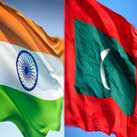Eating Grass: The Making of the Pakistani Bomb, by Feroz Hassan Khan
Brigadier Feroz Hassan Khan (Retd) brings to bear the right credentialsto this six year effort under review. The career Pakistan Army officer andJohns Hopkins University graduate (1989–91), currently a faculty memberof the Naval Postgraduate School, Moneterey, California, spent the lastdecade of his 32 year service (he retired in 2001) dealing with nuclearissues in key positions.
Read More









